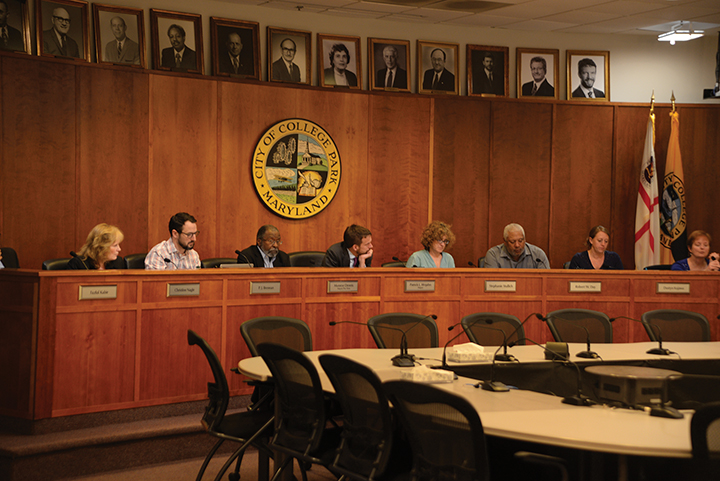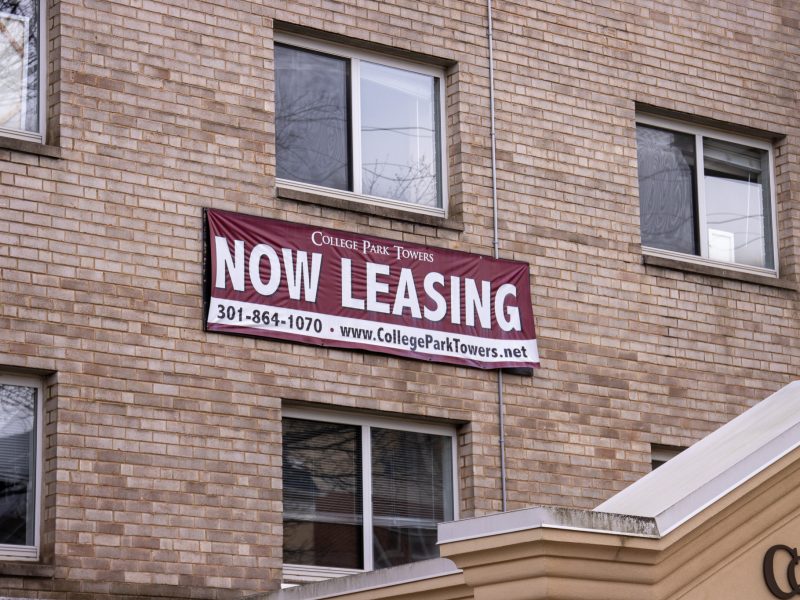The College Park City Council discussed campus tailgates and a student conduct report Tuesday night after reading its public statement about an oversight on a proposed city charter amendment.
The statement, which Mayor Patrick Wojahn and the council published Saturday on the city’s website, acknowledged the oversight with “considerable embarrassment and regret.”
City officials said Friday that the proposed city charter amendment, which would have allowed non-U.S. citizens to vote in municipal elections, would not be adopted. It had appeared to pass Sept. 12 with a 4-3 vote and one abstention, but as of June, changes to the city’s charter require at least six affirmative votes.
The campus tailgates discussion at the worksession came after a residential meeting Monday, when College Park residents said the amount of noise and public drinking has increased since the University of Maryland’s fall semester began.
[Read more: College Park residents say student disruptions in the city have increased this year]
The Interfraternity Council and Panhellenic Association host on-campus tailgates on days of home football games, which the city has financially contributed to. This was to provide an alternative to neighborhood parties for students, and because of it, pre-game partying in city neighborhoods has decreased significantly, according to this week’s mayoral update.
This year, the city agreed to increase its financial support for these events from $7,000 to $10,000 and voted to send a letter to the university in support of the tailgates, according to the update.
Residents commented at the Monday meeting — where 25 to 30 residents came to share their concerns — that neighborhoods have been loud and filled with students, and that there’s been noise disturbances, some public urination and drinking.
Panhellenic Risk Management Vice President Sadie Isakower said the on-campus tailgates have improved in recent years.
“This year was kind of a turning point for the tailgate,” Isakower said. “We couldn’t just put on a space for students to drink that wasn’t in Old Town, and I’m really happy to say we’ve been able to do a lot to really start to change that this year.”
Isakower noted that the IFC and PHA have been using their funding to provide food, hold a cornhole tournament for Greek life chapters and update security requirements through measures such as providing plastic wristbands at the fire marshal’s request last year.
In previous years, tailgate officials had problems with other students replicating paper wristbands, which made it difficult to keep track of the number of attendees, Isakower said. Last year, they accumulated boxes of fake wristbands, and this year they’ve only had about three, she added.
[Read more: College Park noncitizens voting amendment didn’t pass due to a lack of votes]
John Zacker, this university’s vice president for student affairs, noted that chapters that participate in tailgates have to sign a seven-page contract, and that it is “pretty rigorous.”
District 3 Councilwoman Stephanie Stullich said game days are less disruptive since tailgates moved to the campus — with the Towson football game as an exception — but there are still parties on other days.
“I’m not wanting to come down on you for that, at this point … I know you’re trying on the broader issues as well, and we certainly appreciate that,” she said. “I just didn’t want anyone to leave with the idea that the problems are largely solved, they are continuing.”
District 2 Councilman P.J. Brennan said it helps to “strategically locate these events to a centralized location,” which allows the council to “centralize [their] resources.”
“By putting it in one location, we’re also able to more strategically resource our city services in the form of police and code enforcement, and not only address hopefully a minimized issue in the community, but also other issues that are related to tailgating throughout the rest of the city,” Brennan said.
The council also heard a report about cases adjudicated by the Office of Student Conduct during the 2016-17 academic year. The top violations for off-campus incidents included underage alcohol consumption or possession and providing alcohol to underage individuals, disorderly disruptive behavior, false identification, physical harm or apprehension of physical harm and illegal drug consumption or possession, according to a report included in the meeting’s agenda.
The report detailed a three-year summary of the number of students referred to the student conduct office. Between June 2016 and December 2016, there were 237 referrals, as compared to 313 in 2015 and 281 in 2014 within the same time frame. Between the months of January and May, there were 221 referrals in 2017, 223 referrals in 2016 and 205 referrals in 2015.
Many of these referrals were made by University Police, though they can be submitted by anyone in the university community, the report said.
In 2013, the Code of Student Conduct had its jurisdiction expanded to include off-campus activity. The code planned to target “serious cases,” such as sexual assault, hazing and parties that are “disruptive to the campus community and the surrounding communities,” Director of Student Conduct Andrea Goodwin said in September 2013.
CORRECTION: Due to a reporting error, a previous version of this story incorrectly said this university’s on-campus tailgate is hosted by the Interfraternity Council. It is hosted by both the IFC and the Panhellenic Association. This story has been updated.



